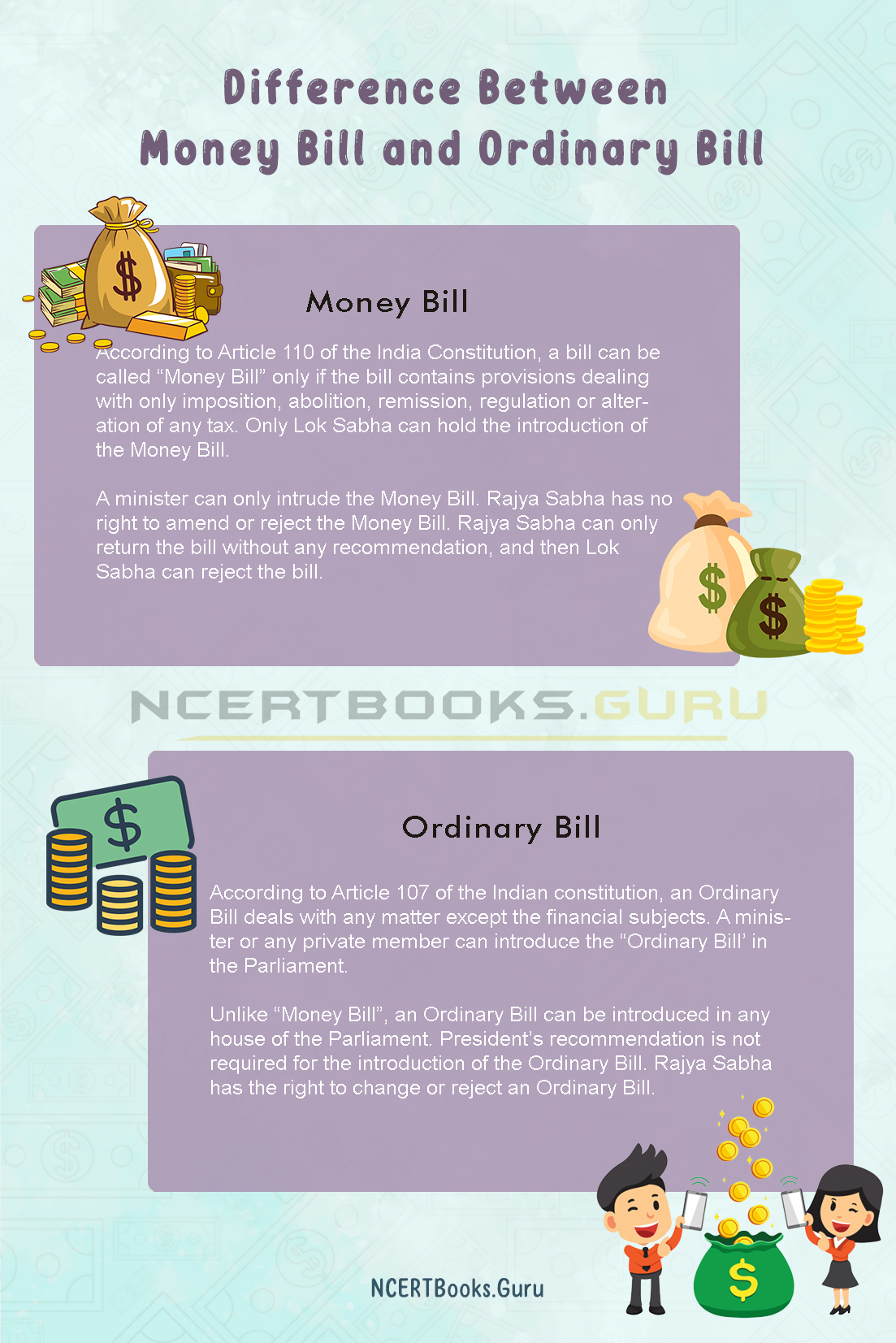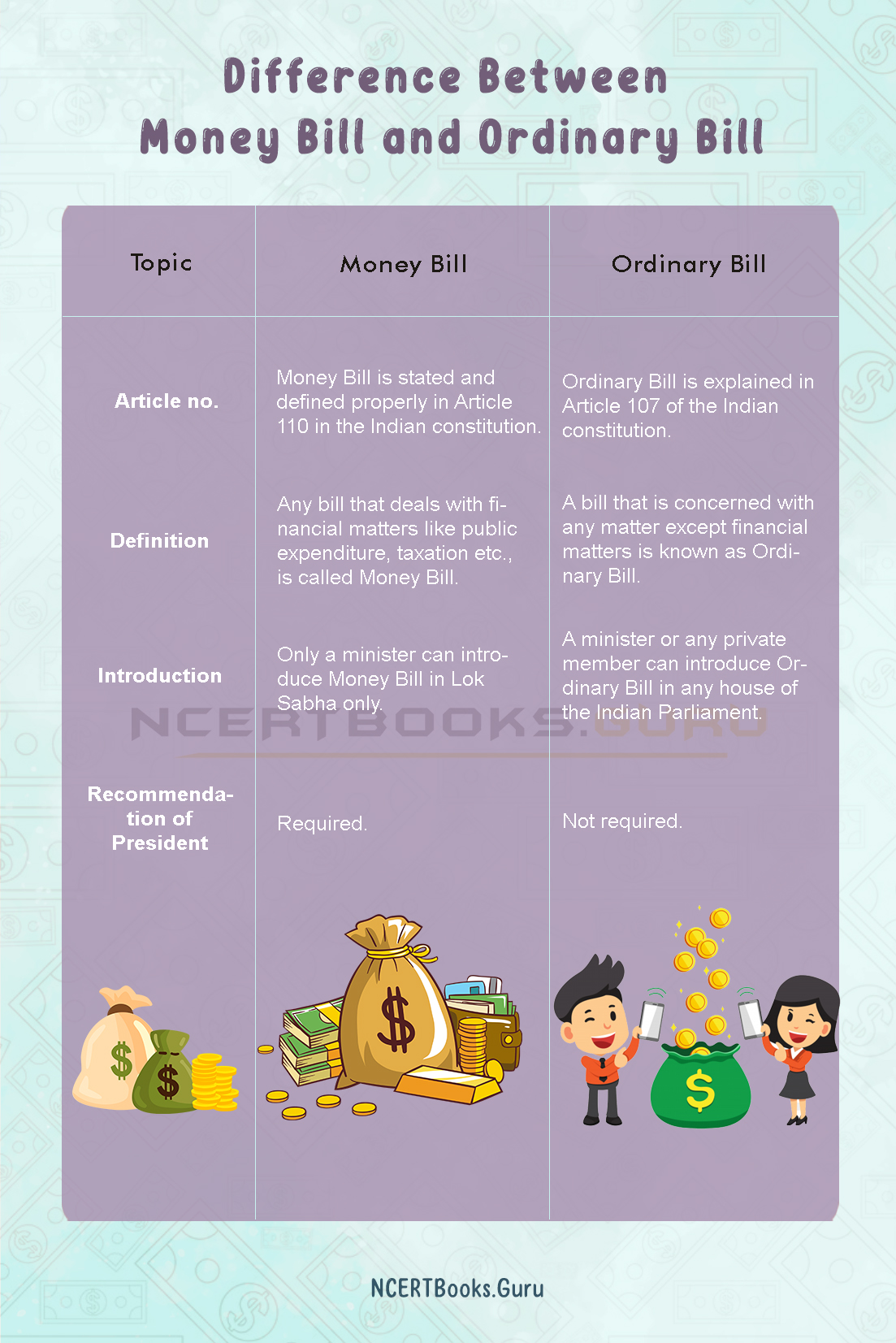Introduction
The definition of “Money Bill” is stated in Article 110 of the Indian Constitution. Money Bill is defined as a bill if it contains provisions dealing with only imposition, abolition, remission, regulation, or any tax alteration. The introduction of an ordinary bill can occur in any house of the Parliament.
You can also find differences between articles on various topics that you need to know. Just tap on the quick link available and get to know the basic differences between them.
What is the Difference Between Money Bill and Ordinary Bill?
About Money Bill
According to Article 110 of the India Constitution, a bill can be called “Money Bill” only if the bill contains provisions dealing with only imposition, abolition, remission, regulation or alteration of any tax. Only Lok Sabha can hold the introduction of the Money Bill.
A minister can only intrude the Money Bill. Rajya Sabha has no right to amend or reject the Money Bill. Rajya Sabha can only return the bill without any recommendation, and then Lok Sabha can reject the bill.
About Ordinary Bill
According to Article 107 of the Indian constitution, an Ordinary Bill deals with any matter except the financial subjects. A minister or any private member can introduce the “Ordinary Bill’ in the Parliament.
Unlike “Money Bill”, an Ordinary Bill can be introduced in any house of the Parliament. President’s recommendation is not required for the introduction of the Ordinary Bill. Rajya Sabha has the right to change or reject an Ordinary Bill.

Difference Between Money Bill and Ordinary Bill
| Topic | Money Bill | Ordinary Bill |
| Article no. | Money Bill is stated and defined properly in Article 110 in the Indian constitution. | Ordinary Bill is explained in Article 107 of the Indian constitution. |
| Definition | Any bill that deals with financial matters like public expenditure, taxation etc., is called Money Bill. | A bill that is concerned with any matter except financial matters is known as Ordinary Bill. |
| Introduction | Only a minister can introduce Money Bill in Lok Sabha only. | A minister or any private member can introduce Ordinary Bill in any house of the Indian Parliament. |
| Recommendation of President | Required. | Not required. |

Similarities Between Money Bill and Ordinary Bill
- Money Bill and Ordinary Bill both can be introduced in Lok Sabha.
- A minister is the only common person in the Money Bill and Ordinary Bill who can introduce both in the Parliament.
- Both of the Money Bill and Ordinary Bill have been defined in the Indian constitution.
- Lok Sabha can reject both Money Bill and Ordinary Bill.
Frequently Asked Questions on Difference Between Money Bill And Ordinary Bill
Question:
How can you describe Money Bill?
Answer:
According to Article 110 of the Indian Constitution, a bill can be called “Money Bill” only if the bill contains provisions dealing with only imposition, abolition, remission, regulation or alteration of any tax. In short, Money Bill deals with financial matters only.
Question:
In which Article of the Indian constitution, you can find the Ordinary Bill?
Answer:
In Article 107, the definition of the Ordinary Bill is written properly.
Question:
Which house has the right to reject Money Bill?
Answer:
Rajya Sabha has no right to amend or reject the Money Bill. Rajya Sabha can only return the bill without any recommendation, and then Lok Sabha can reject the bill.
